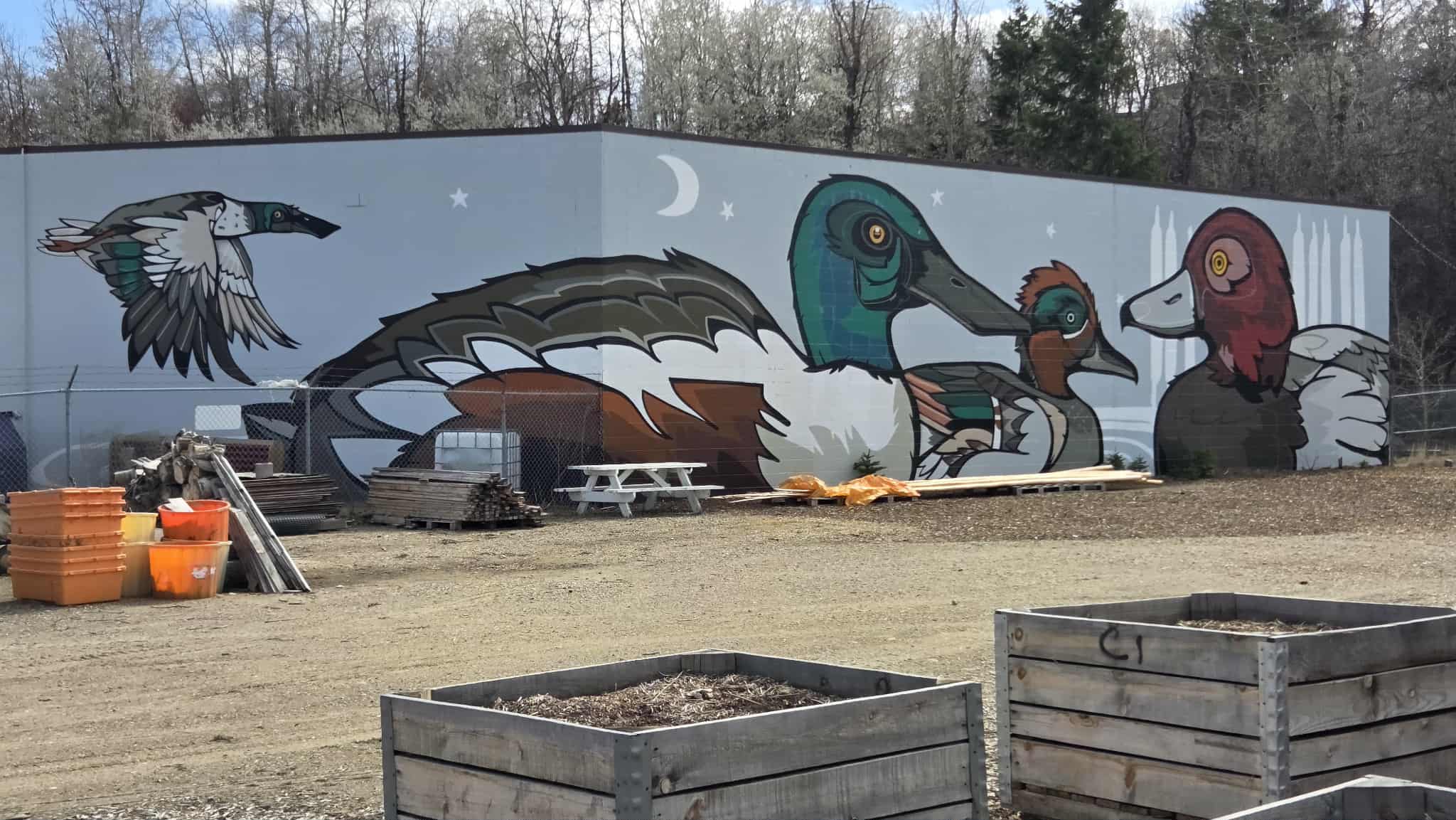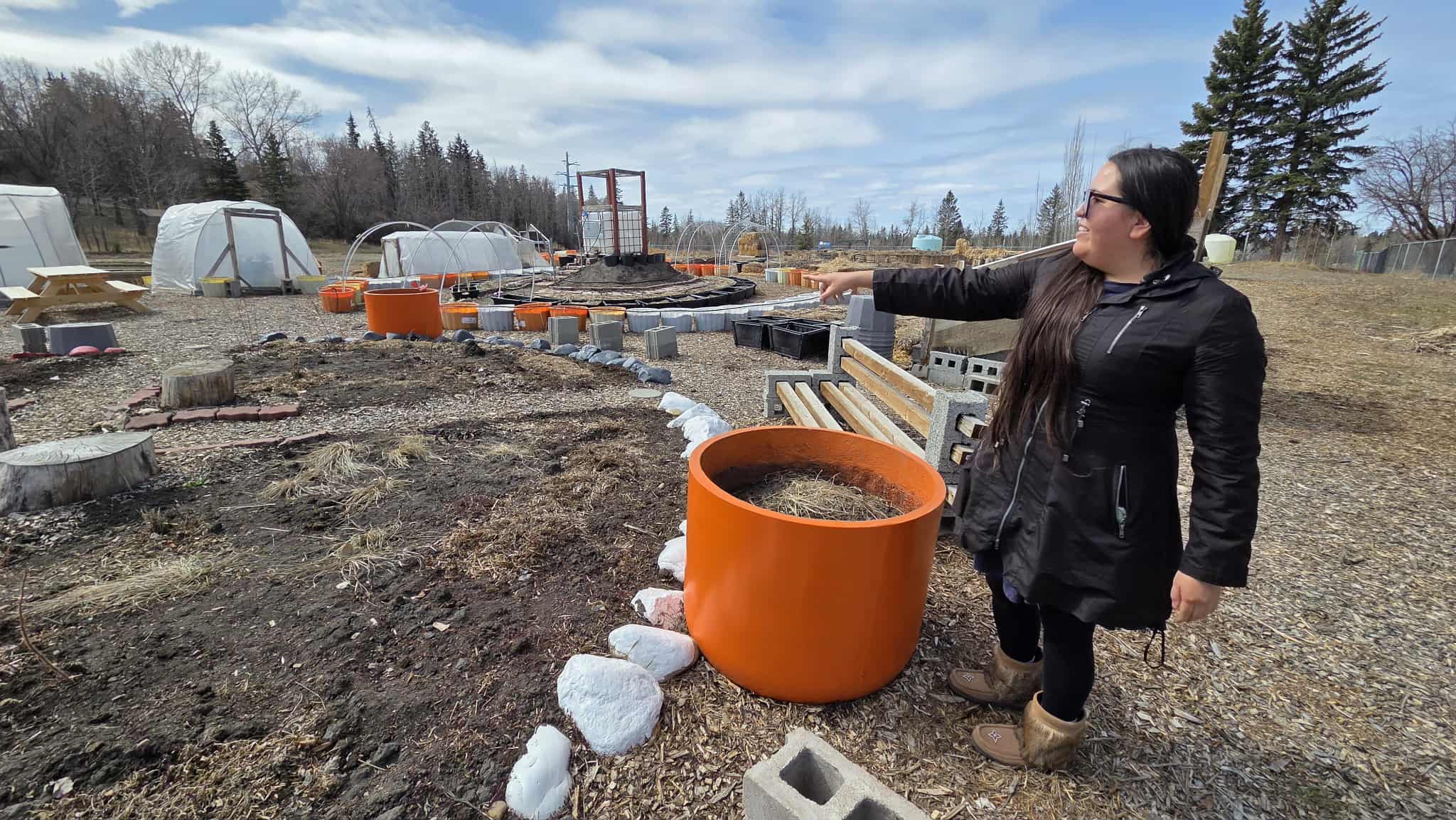The overlooked, perhaps undervalued crow flies over, cawing her caw...
A grey rabbit, eager for the spring feast which he himself helped fertilize, scurries across…
All as the sun beats down on what’s become a bona fide made-in-Red Deer success story.
Nestled in the southwest corner of the blooming neighbourhood known as Capstone, ReThink Red Deer’s Common Ground Garden Project (CGGP) is where Everything Lifestyle caught up with its founder, Art van Zanten, as well as the overseer of its built-in Medicine Wheel Garden, Meagan Ophus, to talk about Earth Day.
Earth Day, April 22, is an opportunity which they, along with Waskasoo Environmental Education Society (WEES) executive director, Todd Nivens, say we should take advantage of to ponder over how the planet’s citizens are collectively and individually working to prolong the health of the third rock from the sun.
The CGGP was originally a product of scouring YouTube during COVID; it was while doing this that van Zanten, who works in the agricultural industry, discovered the concept of ‘Planting it forward,’ akin to the more commonly known paying it forward.
The story he dug into was about a Houston, Texas couple who had procured a four-acre lot from the city, much like how he ultimately did here; and on that plot, the couple allowed refugees to come and grow veggies, which the growers were then able to market and earn income.

At Red Deer’s project, ReThink volunteers take care of the crops, and what’s grown goes to the Mustard Seed and Red Deer Food Bank.
“We’re about to start our fifth growing season. It took a bit to get everything ironed out because with cities there are rules, and it’s not as easy as you’d think to just grow an onion. I always say you have to peel back some layers before you can really get going on something,” he says.
But, with the help of some grant money, they did it. Now they’re growing just about everything under the sun, from corn to zucchini, and even okra.
“One of the things we’re forgotten about in the western world is where our food comes from. We are all connected to the land on which we live, and we get all our food from the land,” he says.
“If you look at healthy communities where they have more people living over 100-years-old, they come together on a regular basis to celebrate food. That’s why we have several meals here throughout the summer; that’s the connection, for me, of Common Ground, to Earth Day. I do believe we need to be reminded that food is one of the pillars of society. We cannot survive without it.”

What’s more is the garden welcomes youth every year on field trips to learn about the gardening process; meantime, curious passers-by in some degree of need have been able to benefit from the garden’s many offerings following friendly conversations with organizers.
For Meagan Ophus, who is Woodland Cree, from the Chipewyan Lakes area in northern Alberta, the chance to be ReThink’s outreach coordinator while launching a social work career, has been abundantly rewarding.
“This 30-foot structure (the Medicine Wheel Garden) is really a meeting place for the Indigenous community. We have a lot teachings here, with Elders, Knowledge Keepers, and we also hold workshops with Indigenous artists. It’s a beautiful place,” says Ophus, who attended RDP and is now working on her Bachelor’s Degree at Maskwacis Cultural College.
“We grow traditional medicine here, sacred medicines, but we also grow community here. That’s what we’re missing most in the world today,” she opines. “A lot of times we come out here, we’re just weeding or planting, or taking care of the soil, and a lot of conversations start. It’s a place for low pressure connection.”

Indeed the sage and the cedar were sprouting out of the dirt as this conversation took place, as were other species around the circular area which features the colours of the wheel’s four quadrants — white to represent the north, the air, winter and sweetgrass; yellow for the east, fire, growth and tobacco; red for the south, water, the moon and summer; and black for the west, the earth, autumn and sage.
Ophus notes that whether it’s the produce or the medicines grown, there’s no financial gain for ReThink Red Deer.
“That’s our way. It goes back to the community, and I’d love to see this become the central hub to get your cedar, your sage, the four sacred medicines, because they’re hard to find,” she says.
Ophus says if someone in need of such substances, be it in tincture, salve, lotion or oil form, they could get it from the Friendship Centre or UIVS, via the garden, and know it was grown in a good way, from start to finish. In other words, she says, the whole community played a part and there were good prayers and energy around it.

“People get together and celebrate or talk about the values of the Earth, but something we as Indigenous people, or at least from my experience, and what I know from my teachings, is that Earth Day is every day for Indigenous people. I was taught to take care of the land, and the people who live on this land. It’s not a one-way relationship where I receive the benefits from the land, and the land does not receive benefits from me,” she says.
“The Earth has taken care of us since time immemorial.”
A hop, skip and a jump across downtown, down 45 Avenue at the Kerry Wood Nature Centre, or often west of the city where they manage Fort Normandeau, you’ll find Todd Nivens and his WEES crew shepherding folks down a myriad of educational avenues.
In fact, WEES just signed a five-year agreement to continue operating those sites, and they’ll be adding the historic J.J. Gaetz House to their management portfolio once renovations to that Michener fixture are complete.
“Earth Day is a time to reflect; It’s time to think about how we as an organization talk to people; and for the public, it’s a chance to look around at how you interact with the planet on a daily basis,” says Nivens, who’s been at the WEES helm over 20 years.
“Little actions matter and what matters most is contact. We’ve been taught since we were kids that we should be turning off lights, and then there’s all the climate change education about reducing our carbon footprint, and making sustainable choices. Some are written off as trivial, like doing away with straws, but the one we really need to strive for is the idea of contact with natural spaces and the elements.”
Here in Red Deer, he says, we’re all fortunate to have a tremendous amount of space for contact with nature in our backyard, namely with over 110 kilometres of interconnected trail, and 14 park nodes.
“Contact builds empathy and respect more than being told to turn off your lights, or to not idle your vehicle, or to buy an EV or hybrid. We can still do all of that but we’re really trying to make sure our messaging and programming is grounded in contact,” Nivens says.
“You can make a difference without chaining yourself to a tree, and that’s not anything we’d ever advocate for anyways; it has its place, but for you and me, it doesn’t have to be that drastic. No one’s saying park your truck on April 22 and don’t drive your kid to baseball practice, it’s more that Earth Day is a chance to take a few minutes that day, walk, bike, or drive if you have to, to a park, be more adventurous, walk the trail around Riverbend, come to the Nature Centre, walk on a surface that’s not asphalt, touch a tree, get your hands dirty, dig in the soil, or plant your garden.”
Programming at WEES includes spring break and summer break camps for kids, and the Kerry Wood Nature Centre will soon be home to a brand new preschool.
The Kerry Wood Nature Centre, as well as the Gaetz Lakes Sanctuary behind it, are open daily, while Fort Normandeau opens May 1.
Red Deerians are also encouraged to watch for exciting relocation news about the Common Ground Garden Project, coming in the near future. The current site is open every Friday from 8 a.m. to noon, starting mid-May, and other events will be held there throughout the summer.
For more information on both of the above organizations, visit rethinkreddeer.ca and waskasoopark.ca.
More about Earth Day is at earthday.org.
by Josh Hall | @Vancan19
—